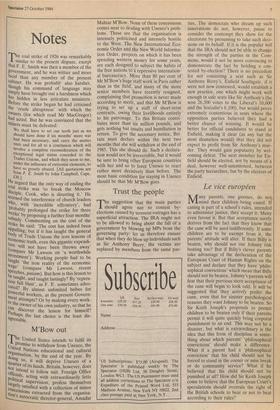Le vice europeen
Many parents, one guesses, do not mind their children-being caned. If caning is part of a school's rules, intended to administer justice, they accept it. Many even favour it. But that acceptance surely derives from the fact that they know that the cane will be used indifferently. If some children are to be exempt from it, the parents' attitude will alter. If their Billy is beaten, why should not our Johnny risk beating too? But if Billy's clever parents take advantage of the declaration of the European Court of Human Rights on the subject and declare that they have 'philo- sophical convictions' which mean that Billy should not be beaten, Johnny's parents will fear that their previous stern acceptance of the cane will begin to look odd. It will be suggested that they actively prefer the cane, even that for sinister psychological reasons they want Johnny to be beaten. So Sir Keith Joseph's proposals to permit children to be beaten only if their parents permit it will quite quickly bring corporal punishment to an end. This may not be a disaster, but what is extraordinary is the idea that this form of discipline is some- thing about which parents' philosophical convictions' should make a difference. What if a parent had a 'philosophical conviction' that his child should not be forced to stand in the corner or miss break or do community service? What if he believed that his child should not be punished at all? How did Sir Keith Joseph come to believe that the European Court's speculations should overrule the right of the British schools to beat or not to beat according to their rules?


















































 Previous page
Previous page